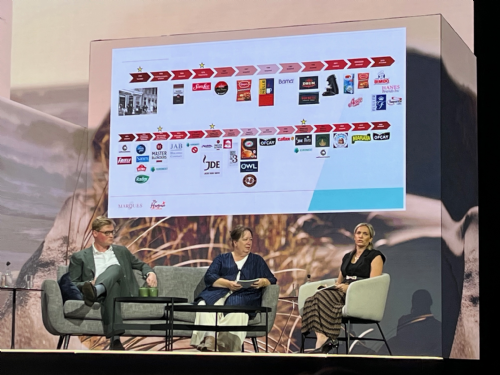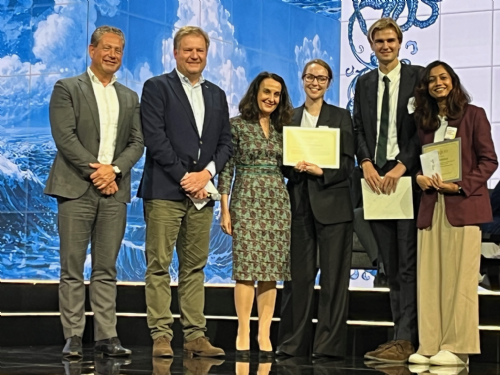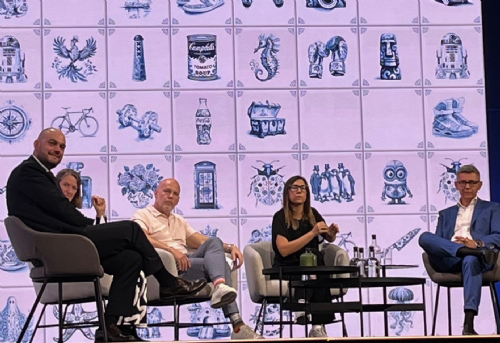Now in its twelfth year, Class 46 is dedicated to European trade mark law and practice. This weblog is written by a team of enthusiasts who want to spread the word and share their thoughts with others.
Click here subscribe for free.
Who we all are...
39th Annual Conference: parts 5 and 6
 |
| Geert Lokhorst, Dieuwerke van der Schalk and Michelle Ciotola |
Part 6 of the Annual Conference, which is taking place in The Hague this week, covered “Brands in international M&A”.
Dieuwerke van der Schalk, JDE Peet’s, The Netherlands and Member of MARQUES Council and Intellectual Asset Management Team, presented a video summarising the long history of her company, which has been through various mergers and de-mergers. “M&A often happens when you’re not expecting it,” she said.
When should trade mark counsel become involved in an M&A transaction? “It’s often not possible that you can be involved at an early stage,” said Dieuwerke, while Geert Lokhorst, De Brauw Blackstone Westbroek, The Netherlands, contrasted the situations of public and private companies.
Dieuwerke emphasised the benefit of being involved early on, saying IP can make a significant difference to elements of a deal including valuation and structuring. “There may also be a situation where recent brands have not been registered yet, and competitors may be interested in starting opposition proceedings,” said Geert. Competitors may think a company is willing to resolve any issues to avoid jeopardising the deal.
“There’s often a push to make sure major issues are resolved in advance of the transaction,” added moderator Michelle Ciotola, Cantor Colburn LLP, USA, a Member of the MARQUES Intellectual Asset Management Team.
Geert said it is critical that the M&A team knows where and when to find the IP team. “It’s very important to know if you’re speaking the same language as the tax people. When you’re talking about ownership, there may be a difference between economic and legal ownership,” said Dieuwerke. Michelle stressed the importance of “having a good dialogue with all the parties involved”.
 |
| The Lewis Gaze Memorial Award was presented before lunch. The winner was Barbara Scheurwater of Utrecht University; 2nd place was Bas Meijer of Leiden University; and 3rd was Harini Venkatesh of Maastricht University. |
All the speakers stressed the need to understand the purpose of the deal, as this can affect the IP strategy. Asked how she approaches each deal, Dieuwerke said there is no playbook but it is key to have a very good database, and a list of agreements and oppositions. It is essential to contact the other side to find out what rights they have, which agents they use etc.
“Your employees are also going to be very eager,” she added – so they may proactively register domain names or other assets. Geert also urged the importance of “getting all your agreements in order”. This includes in- and out-licences and coexistence agreements.
Due diligence is important, said Geert, but needs to be prioritised: “You can’t check everything … If you keep asking questions, you’re going to really annoy the IP counsel on the other side.” Michelle cited a deal where a party repeatedly asked for certificates for common-law (unregistered) trade marks, despite being told they did not exist.
Other issues to consider are: what agreements are in place relating to any marks and how will they impact any future holder? What restrictions, such as product or geographical, are in place? Certain things can kill the deal, such as a licence being revoked when the deal is announced or regulatory restrictions.
A point the speakers emphasised was that IP issues continue post-deal, including changes in title and recordal formalities in different jurisdictions. The language used in assignment documents is particularly important in the US, said Michelle: “Make sure the documents you have meet the local requirements, or that you have procedures in place to meet them.” She also stressed the need to understand the corporate structure of the new entity, and where the trade marks will sit within it.
Michelle highlighted the importance of updating records in a timely fashion. As time goes by, it can be hard to remember and find the necessary details. This can lead to extra costs and workload, and the risk of losing rights.
Post-deal, issues can arise if part of a business is sold, meaning the brand can be used by two different companies. “We often see a licence to continue to use the brand for one year,” said Geert. Michelle also stressed the importance of quality controls in licence agreements. In addition, M&A deals can lead to new brand names and company names. Sometimes these decisions are rushed and not thought-through but they still have to be searched and cleared.
Key takeaways from the session were: always have your database in order; don’t be afraid to say “No”; train employees not to get carried away; balance competing teams that are involved in the deal; and the real work often begins post-closing.
International jurisdiction
 |
| Pascal Böhner, Hens de Koning-Ghijsen, Björn Norberg, Alicia Martin and Alberto Camusso |
Part 5 of the Annual Conference looked at “International jurisdiction in a changing world”. The discussion was moderated by Pascal Böhner, Bardehle Pagenberg Partnerschaft, Germany, Member of the MARQUES Dispute Resolution Team. He posed questions to Hens de Koning-Ghijsen, Heineken International B.V, The Netherlands, Member of the MARQUES China Team; Björn Norberg, H&M - Hennes & Mauritz , Sweden; Alberto Camusso, Studio Legale Jacobacci & Associati, Italy, Chair of the MARQUES Dispute Resolution Team; and Alicia Martin, PVH Europe B.V, The Netherlands about dispute resolution strategies in a global context.
The Corporate Breakfast was also held today. More than 80 in-house practitioners took part in a Q&A session with EUIPO Executive Director João Negrão.
Posted by: Blog Administrator @ 15.14Tags: The Hague, Annual Conference, Lewis Gaze,


 Sharing on Social Media? Use the link below...
Sharing on Social Media? Use the link below...Perm-A-Link: https://www.marques.org/blogs/class46?XID=BHA5384

